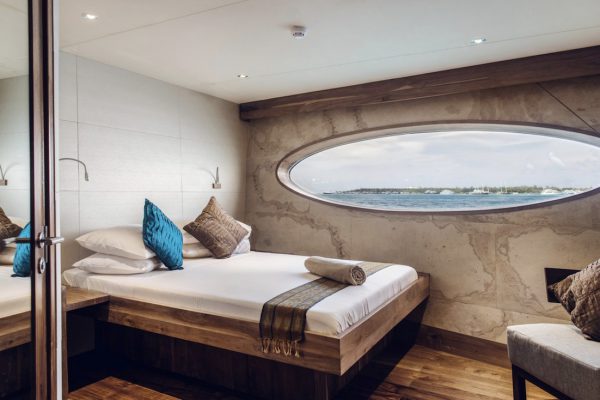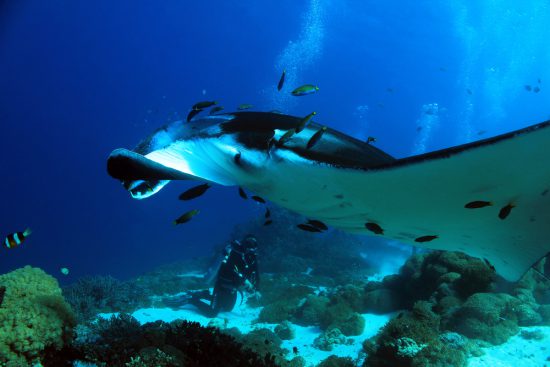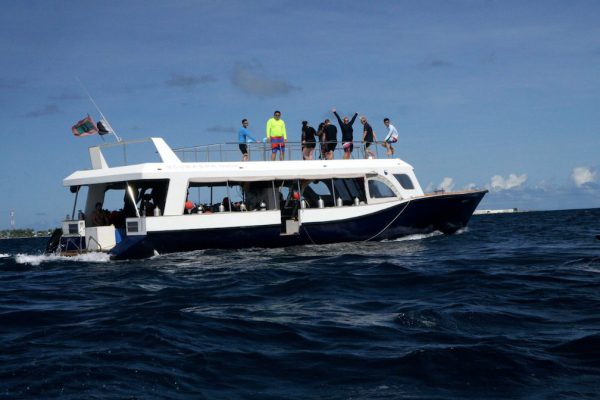Hi divers! I get a lot of questions from divers about liveaboards so I made this list of FAQ about scuba diving from liveaboards. I hope you find this helpful.
Frequently Asked Questions About Diving From A Liveaboard
- What Is a Liveaboard?
- Where Do Liveaboards Operate?
- What’s the Cost of A Liveaboard?
- What’s The Duration Of A Typical Liveaboard Trip?
- What Are The Choices of Liveaboard Accommodations?
- What’s The Food Like On A Liveaboard?
- What Diving Experience Do I Need to Dive From A Liveaboard?
- What Dive Sites Will I Visit From A Liveaboard?
- What Marine Life Can I Expect To See Diving From A Liveaboard?
- Does The Liveaboard Have Scuba Gear?
- How Many Dives Can I Do Daily From A Liveaboard?
- What Will My Dive Schedule Be Like On The Liveaboard?
- Do Liveaboards Have Dive Guides And Instructors?
- What Safety Measures Do Liveaboards Have?
- Is There A Limit To The Number Of Divers On The Liveaboard?
- Do Liveaboards Have A Cancellation Policy?
- What’s The Water Temperature Like Diving From Liveaboards?
- Can I Bring Non-Divers/Snorkelers On The Liveaboard?
- How Many Divers In A Dive Group On A Liveaboard?
- Is There Freshwater For Rinsing Dive Gear On Liveaboards?
- Do Liveaboards Have A Policy On Night Dives?
- Do Liveaboards Have Additional Costs or Hidden Fees?
- What’s The Social Atmosphere Like On A Liveaboard?
- Is There Wi-Fi And Cellular Service On Liveaboards?
- What Happens If My Liveaboard Runs Into Bad Weather?
- Will Liveaboards Allow Me To Bring My Dive Instructor?
- Can Solo Divers Dive From Liveaboards?
- What Should I Bring With Me To Vacation On A Liveaboard?
- Do Liveaboards Have A Place To Store My Valuables?
- Are There Any Liveaboard Scuba Diving Deals?
- Can I Bring A Group Of Divers To The Liveaboard?
- Do I Have To Give a Tip On The Liveaboard?
- Do I Need To Have Insurance For Diving From A Liveaboard?
- Where Are The Best Places To Go For Liveaboard Diving?
- Do I Dive From The Liveaboard’s Platform or Tenders?
- Are You Ready For Liveaboard Diving?
What Is a Liveaboard for Scuba Divers?

*A liveaboard, as the name implies means living abroad on a vessel. They’re big yachts designed or adapted to cater to scuba divers who want to dive at remote locations longer than one night. There are many reasons why millions of divers do this. It’s a dive vacation on a large boat where they sleep, eat, and do multiple dives a day for an extended period ranging from several days to a week or more.
Where Do Liveaboards Operate?
*Liveaboards operate worldwide. The popular diving destinations (*) are:
- Asia Pacific *
- Caribbean *
- Europe
- Indian Ocean
- Middle East and the Red Sea *
- North America
- South and Central America
- Southeast Asia *
What’s the Cost of A Liveaboard?
*There’s an excellent variety of liveaboards worldwide, some large and some smaller. It depends on your lifestyle preferences. You have a selection of budget-friendly options that are popular ranging from $150 USD/day to the top-of-the-line luxury dive liveaboards priced at $600 USD/day.
What’s The Duration Of A Typical Liveaboard Trip?
*The typical average stay is 7 nights but divers book anywhere from 3 to 14 days. This depends on your desired destinations and itinerary.
What Are The Choices of Liveaboard Accommodations?

*This depends on your price level and your boat. Your liveaboard accommodations vary from basic bunk beds to luxurious private cabins attached with ensuite bathrooms. The budget options might have communal bathrooms.
What’s The Food Like On A Liveaboard?

*If you require special dietary meals or have allergies to certain foods, liveaboards are very good at catering to your needs. It’s important to let your Liveaboard representative know this in advance.
The meals are typically served buffet style, table service and snacks are available too. The professional chefs present a variety of cuisines ranging from local to Western foods to satisfy your preferences ensuring you have the energy to enjoy your dive vacation.
What Diving Experience Do I Need to Dive From A Liveaboard?
*It’s important to research the Liveaboard’s itineraries and look for the dive-type experience and certification requirements. Some liveaboards cater to all divers, beginners, intermediate to advanced.
Some liveaboards require a PADI Advanced Open Water Diver Certification with proof of minimum logged dives.
Please bring your dive logbook and your scuba certification card(s).
A few liveaboards offer the PADI Open Water Diver Course Certification, but in my opinion, you should be a certified diver. If you want to learn how to scuba dive confidently from a liveaboard, here are some great tips to get you started.
What Dive Sites Will I Visit From A Liveaboard?
*Your specific dive sites are determined by your itinerary and destinations planned by your liveaboard operator/captain and dive guides. Liveaboards can take you to remote dive sites where day boats can’t go. You can enjoy diving underwater tunnels, shipwrecks, coral reefs, wall diving, marine sanctuaries, drift diving and more without a crowd of divers.
What Marine Life Can I Expect To See Diving From A Liveaboard?

*You can expect to see a variety of marine sea creatures from turtles, dolphins, sharks, eye-catching colourful fish, and a variety of invertebrates and corals. If the current is stronger, you might see gentle whale sharks, gigantic manta rays and hammerheads.
Does The Liveaboard Have Scuba Gear?
*Many liveaboards rent scuba gear as an extra service and some may charge you. Typically, the liveaboard representatives will encourage you to bring your equipment because you’ll be familiar with it and feel more comfortable. Bring your own dive computer, mask, and fins at the least minimum.
How Many Dives Can I Do Daily From A Liveaboard?
*This depends on the dive conditions and your itinerary. Liveaboards generally offer multiple dives a day. This can be 2 dives or 4 dives a day. Of course, you decide whether you want to join in on the dives or have a ‘chill’ day to do other activities.
What Will My Dive Schedule Be Like On The Liveaboard?
*Liveaboards normally have a structured dive routine they follow. The dives are scheduled for the morning, afternoon, and sometimes in the evening. Your meals and relaxation activities are between the dives.
Do Liveaboards Have Dive Guides And Instructors?
*Liveaboards have experienced dive guides, some are dive masters and instructors with knowledge of the particular dive sites. They discuss their dive site orientation, dive safety guidelines, and what exciting sea creatures to look for.
What Safety Measures Do Liveaboards Have?
*When you arrive on a liveaboard, you’ll be welcomed with an orientation where you’ll get a full tour and learn about their emergency procedures, including where to find oxygen and first aid equipment.
For your peace of mind, I recommend having a list of questions to ask the liveaboard operator before you book.
Is There A Limit To The Number Of Divers On The Liveaboard?
*Liveaboards have a limit to the number of divers. It can be from 15 – 30 divers depending on the boat’s size and the destination’s regulations.
Do Liveaboards Have A Cancellation Policy?
*Absolutely! Liveaboards have cancellation policies which can vary since they’re set by the operators. Before you book, take a moment to read through the cancellation policy and look out for any penalties. Cancellation penalties are usually within a certain timeframe BEFORE YOUR TRIP.
What’s The Water Temperature Like Diving From Liveaboards?
*Liveaboard operators usually provide average water temperatures on their destinations to help you plan your diving exposure protection.
Can I Bring Non-Divers/Snorkelers On The Liveaboard?
*While liveaboards are primarily centred around diving, your non-diving companions can still enjoy a variety of other activities. Many liveaboards offer non-diver packages, allowing them to engage in other ocean pursuits like paddleboarding, snorkelling, or jet skiing, depending on the vessel’s amenities.
If you’re looking for an enhanced experience, luxurious liveaboards often feature additional perks such as onboard spas and yoga classes, offering a well-rounded package for non-divers.
How Many Divers In A Dive Group On A Liveaboard?
*There should be at least one fully-trained Dive Master (tour guide) with Rescue Certification for every six to eight divers. Additionally, each dive group underwater should have a dedicated Dive Master (tour guide).
Is There Freshwater For Rinsing Dive Gear On Liveaboards?
*Liveaboards typically provide freshwater rinse tanks or showers for rinsing the salt off your dive gear.
Do Liveaboards Have A Policy On Night Dives?
*As divers, we want that nocturnal marine experience as part of our vacation memories so night dives are commonly included in liveaboard itineraries.
For night dives, you need at least a PADI Open Water Diver certification or an equivalent. Alternatively, you can complete your Night Adventure Dive as part of the PADI Advanced Open Water Diver course.
Do Liveaboards Have Additional Costs or Hidden Fees?
*There will be extra costs. Before booking with your liveaboard, you’ll want to inquire about gear rentals, taxes, gratuities, internet packages, and destination park fees.
If you’re wondering about alcohol, some liveaboards can offer a limited or reasonable selection of beer, wine, and spirits. These may be complimentary or at an additional charge.
Liveaboard staff can prevent you from going on a dive if you’ve consumed alcohol.
What’s The Social Atmosphere Like On A Liveaboard?
*Because you’ll be with like-minded souls, that is, scuba divers, you’ll enjoy sharing awesome dive stories and experiences. Liveaboards offer a social atmosphere in communal surroundings where you can socialize and relax comfortably. Who knows, you might even meet a lifetime dive partner!
Is There Wi-Fi And Cellular Service On Liveaboards?
*Liveaboards often venture to exciting and remote locations. This makes it challenging to stay connected to the outside world. However, many now offer onboard WiFi, which you can verify by checking the symbols under the ship’s name when researching. Be aware that internet packages might come at an additional cost.
If the liveaboard you’re on doesn’t have WiFi, it will likely have a satellite phone. Operators have this for emergency purposes and they usually provide this phone number so guests can share it with their loved ones for emergency contact.
Here’s what I recommend: For your peace of mind and connectivity while abroad, consider getting a local SIM card upon arrival at the airport, or an eSIM if your network provider supports it.
What Happens If My Liveaboard Runs Into Bad Weather?
*Because the operator’s number one priority is guest safety, they may adjust their activities and itineraries due to bad weather conditions. Liveaboards have contingency plans which may mean going to a different route or finding sheltered dive sites ensuring your safety while still enjoying your vacation.
Will Liveaboards Allow Me To Bring My Dive Instructor?
*Bringing your dive guide or instructor to your liveaboard is permissible with some liveaboards but before you do this, they will want to know about this in advance. A discussion must take place so both parties have an agreement.
Can Solo Divers Dive From Liveaboards?
*Absolutely! Solo divers are welcome! Your Dive Master will ensure you have a dive buddy. About accommodations, many liveaboards will offer you two choices:
- If you want to keep your costs down, the operator can pair you with another single diver avoiding an additional fee.
- If you want your own space, you can go for a single supplement with a private cabin.
What Should I Bring With Me To Vacation On A Liveaboard?
*Usually, operators will give you a list of things to pack when you book. However, through my experience and research, the following is what I recommend for your liveaboard diving packing list (in addition to your usual toiletries):
- Seasickness prevention – You never know what the weather will be like and if you’re prone to getting seasick, don’t forget to pack Ginger Gravol or other preventative medicine.
- 3 swimsuits and 2 wetsuits – Because you’ll be diving a lot of diving in a day, these items will be damp and uncomfortable for your next dive.
- Sunscreen protection – Bring a wide-brimmed hat, ocean sunscreen, and polarized sunglasses.
- Jacket – Even though you’ll be in tropical weather, the evenings and the liveaboard’s air conditioning can get you feeling chilly.
- Save A Dive Kit – This includes bringing spares like a mouthpiece, o-rings, small tools, and straps. If something breaks or you lose a part, liveaboards will not take you back to land.
- Collapsible luggage or soft-side luggage – Your liveaboard cabin will have tight storage space.
- Small external hard drive – This is good to have for your photos so that you can do all your backups of your memories and have a grand ole time sharing them with other guests.
- Camera equipment – This includes bringing extra batteries and chargers.
- Small extension cord – This item is handy because some liveaboards have plugins that are not conveniently located for your laptop to sit with you.
How Do I Get To The Liveaboard?
*When you arrive in the country where your liveaboard departs from, there are ways you can get to your liveaboard:
- Domestic Flight – If your liveaboard is in a more secluded area.
- Cab or Other Public Transportation – If your liveaboard is a short distance away.
- Local transfers – Many liveaboards offer local transfers on your arrival and departure day.
You will want to discuss this with your Liveaboard Operator before booking.
Do Liveaboards Have A Place To Store My Valuables?
*Many liveaboards have a safety deposit box for their guests but they’re not very large.
Are There Any Liveaboard Scuba Diving Deals?
*Absolutely! I love getting dive deals. Liveaboards often have special deals like early bird booking, seasonal deals, and last-minute deals. You can check them out here [link].
Can I Bring A Group Of Divers To The Liveaboard?
*Yes! A large group of divers (6+) travelling together can book as a group and get discounted rates or charter the entire liveaboard allowing you to control your itinerary and giving more freedom.
Do I Have To Give a Tip On The Liveaboard?
*Tipping is not a requirement on liveaboards. It is, however, a standard practice among divers who like to show their appreciation to their tour guide (Dive Master/Instructor) and the boat’s crew (professional chefs and maintenance crew). If you like, give 5-10% of your liveaboard price at the end of your trip. This amount is split amongst the entire crew.
Do I Need To Have Insurance For Diving From A Liveaboard?
*A liveaboard is most unlikely to sink however, it’s like the scarcity of a house burning down. There is no guarantee that an accident won’t happen. It would help if you got travel insurance that covers lost items and other incidents.
No matter where you scuba dive from, it should be your standard procedure to bring your diver’s insurance from DAN (Divers Alert Network). This covers your diver’s medical emergency for air transportation and decompression treatments. I recommend a discussion with your Operator about the location of the nearest divers’ medical facility.
Where Are The Best Places To Go For Liveaboard Diving?
*I admit, this is one of the more popular questions, so we made up a list of places for the best liveaboard scuba diving vacations worldwide. If any places from it light up your heart, please dive deeper by clicking on its attached link to get details of available liveaboards.
Do I Dive From The Liveaboard’s Platform or Tenders?

*This depends on the liveaboard’s size and the dive site’s environment. There are a couple of ways to enter and exit the water. Some use tenders like dinghies, dhonis, or RIBs (Rigid Inflatable Boats) to go to remote dive sites and staff will help you get acquainted. The other way is a giant stride off the platform if the liveaboard is small.
Are You Ready For Liveaboard Diving?
Now that I’ve answered your questions, are you ready to embark on an incredible liveaboard scuba diving adventure? Check out my reviews and plan your next unforgettable vacation with a liveaboard!
If you have any questions or comments, please leave them in the comment box below, and I’ll get back to you promptly.
Thanks for reading!
Monica
